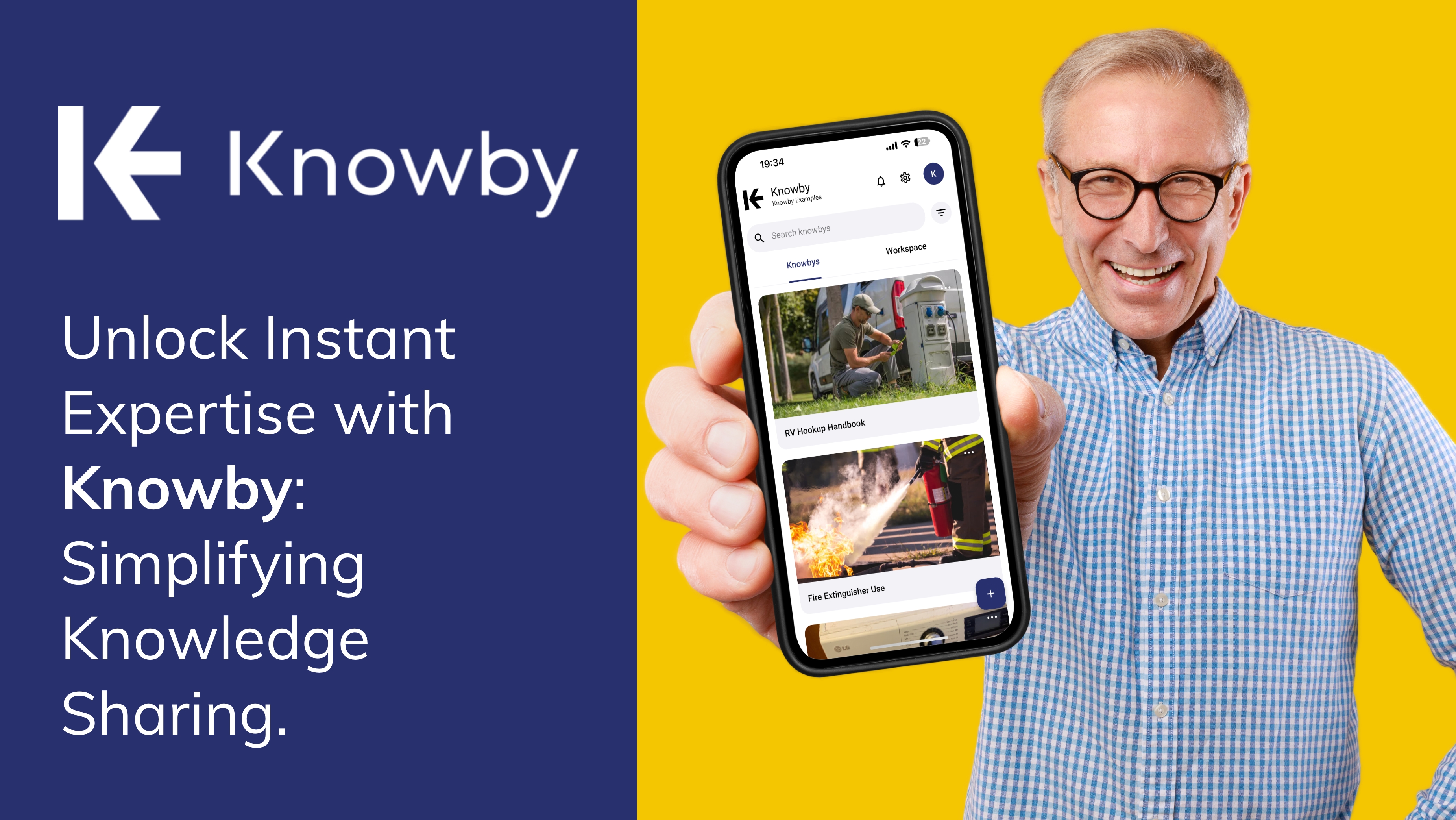How To Level Up Knowledge Sharing in Your Teams

April 11, 2025

Foster dynamic knowledge sharing within every team. Efficiently capture, organise, and distribute valuable insights—giving your teams, or customers, instant access to all the knowledge they need in the one place.
Whether you're managing a small operations crew in the field or leading a large-scale enterprise team, one thing holds true: knowledge is one of your most valuable assets. But if that knowledge lives only in someone’s head—or worse, is lost when they walk out the door—your business pays the price. That’s why building a strong culture of knowledge sharing is essential.
Let’s explore what knowledge sharing really means, why it matters, and how your team can get better at it by using Knowby.
What is Knowledge Sharing?
Knowledge sharing is the intentional act of exchanging information, skills, or expertise between individuals, teams, entire organisations or your third party clients. It’s how experienced team members pass on insights to newer staff, how operational know-how gets documented for future use, and how innovations are spread company-wide.
In a business context, knowledge sharing helps ensure that important information isn’t siloed. It enables teams to make faster, smarter decisions by tapping into what the business already knows.
Think of it this way: if knowledge is power, then sharing it multiplies that power across your organisation.
Benefits of Knowledge Sharing in the Workplace
When knowledge is openly shared, it turns individual expertise into collective strength. From faster onboarding to fewer mistakes and more innovative ideas, the benefits of knowledge sharing ripple across the entire organisation. Here are the benefits of knowledge sharing when you foster it in the workplace.

Improves Knowledge Retention
When people leave a company, their knowledge often goes with them—unless it’s been captured and shared effectively. Creating systems for knowledge sharing means your critical know-how stays within the business, even as teams evolve.
Enhances Team Collaboration
Shared knowledge builds trust, transparency, and stronger collaboration. When team members have access to each other’s know-how, they work more cohesively and support each other better—whether they’re in the same office or on different sides of the country.
It also reduces dependency on specific individuals. Rather than one person becoming the “go-to” for every question, documented knowledge allows everyone to contribute and help solve problems. This builds confidence, encourages cross-functional teamwork, and creates a culture where collaboration isn’t just encouraged—it’s embedded into everyday operations and procedures.
Whether you're a field-based technician or part of a hybrid head office team, being able to access and contribute to shared knowledge fosters connection and collective accountability.
Increases Productivity
When employees can access answers quickly instead of reinventing the wheel or waiting for someone to respond, productivity gets a major boost. Knowledge sharing removes friction from everyday tasks and empowers your team to act confidently.
Think about how much time gets lost searching through emails, asking around for “how we did this last time,” or re-training someone on a task that’s already been documented. With a knowledge sharing system in place, teams spend less time chasing information and more time making progress.
For example, Knowby’s step-by-step work instructions can be accessed instantly via QR code—helping teams get on with the job without delays or miscommunication.
Reduces Training & Onboarding Time
Instead of spending hours manually walking new hires through every process, documented knowledge allows them to self-learn and get up to speed faster. That’s a huge win for both trainers and trainees.
"A lot of the staff that we tend to bring on are visual learners, so Knowby is a lot easier for people to pick up and adapt. We find that we get a lot more engagement and procedures are actually being followed."
Boosts Employee Engagement
Sharing knowledge signals to team members that their experience is valued. It creates a culture of respect and learning, which keeps people engaged and more likely to stick around.
When employees feel encouraged to contribute what they know—and see that knowledge being used by others—it fosters a sense of ownership and pride in their work. It also helps team members feel seen and heard, especially those who might not speak up often in meetings but still hold valuable insights.
Knowledge sharing platforms also give employees opportunities to learn from each other, not just top-down. That sense of mutual support builds stronger teams and more meaningful work environments.
Promotes Innovation & Continuous Learning
When knowledge flows freely, so do ideas. A company culture of knowledge sharing encourages experimentation, collaboration, and a mindset of continuous improvement—essential ingredients for any innovative business.
By making it easy to share what works (and what doesn’t), teams are better equipped to test, refine, and improve their processes. Mistakes become learning opportunities. Wins become replicable frameworks. And individuals feel safe contributing new approaches, knowing their input is valued.
Plus, when knowledge sharing platforms make it effortless to document new methods, innovations don’t just sit in one person’s brain—they scale across the business, no matter how fast you’re growing.
Knowledge Sharing with Knowby
Unlock success with efficient knowledge transfer among your teams 🚀
Knowledge Sharing Methods
There’s no one-size-fits-all approach to knowledge sharing. Different businesses use different methods depending on their team structure, industry, and tech stack. Here are the most common ways teams are sharing what they know:
Formal Training Methods
These include structured programs like workshops, inductions, instruction manuals, and online courses. They’re ideal for standardising processes, ensuring compliance, and bringing new hires up to speed consistently.
However, formal training can be costly. It takes time to prepare, deliver, and update content—and often requires in-person coordination or dedicated learning platforms. Without regular maintenance, even the best-designed training materials can become outdated fast.
That’s why more businesses are moving towards microlearning tools that can complement or replace traditional training. With a knowledge sharing platform, you can turn formal knowledge transfer into bite-sized, easy-to-follow content that’s quick to update and even quicker to access.
Informal Knowledge Sharing
This is often the unsung hero of how work really gets done. Informal knowledge sharing happens during quick direct messages, impromptu desk chats, annotated screenshots, or a whiteboard brainstorm after a meeting.
It’s spontaneous, low-effort, and keeps teams agile—especially in fast-paced or hybrid environments. But there’s a catch: informal knowledge isn’t always documented. When the person who “just knows how it works” is out sick or leaves the business, so does that know-how.
To make the most of informal knowledge sharing activities, it’s worth capturing those moments using easily accessible knowledge management systems. A quick video, screenshot, or step-by-step guide can turn off-the-cuff advice into a lasting resource.
Mentorship
Pairing experienced staff with new or less experienced team members is a classic and effective way to pass on deep, contextual knowledge. It allows for tailored learning, trust-building, and real-time feedback—which is especially valuable for frontline industries, technical roles, or leadership development.
But while mentorship is powerful, it isn’t scalable on its own. It needs the support of documented processes and resources that mentees can return to between sessions.
With the use of a knowledge sharing platform, mentors can create simple visual guides to support knowledge transfer—ensuring mentees have reliable tools at their fingertips and aren’t left in the dark when questions arise.
Collaboration
Cross-functional collaboration (e.g. between engineering and marketing, or operations and sales) naturally drives knowledge sharing initiatives across departments. It breaks down silos and allows people to see how their work connects to the bigger picture.
To make collaboration work, businesses need to provide shared spaces and tools where people can co-create, access, and build on each other’s knowledge—without creating confusion or duplicating efforts.
That might include shared drives, cloud-based tools, and more structured platforms like Knowby, which make it easier to standardise instructions, document lessons learned, and keep key information accessible across teams.
Knowledge Sharing Platform
Purpose-built platforms like Knowby take all of the above and bring them together in one place.
Instead of scattering knowledge across shared drives, sticky notes, emails, and tribal memory, Knowby lets teams create short, structured "knowbys"—bite-sized work instructions with visual, step-by-step guidance. These can be accessed instantly via QR codes, embedded links, or search, making them perfect for on-the-job support.
Whether it’s onboarding a new hire, standardising a process, or documenting a unique workaround discovered on the fly, Knowby ensures that valuable collective knowledge doesn’t get lost—it gets captured, organised, and shared across the business.
"Knowby isn’t just a tool — it’s a platform that helps our staff grow and share knowledge. Tools like Knowby ensure the team is equipped to handle challenges independently, day or night."
Encourage Knowledge Sharing Culture Using Knowby
Even with the right tools in place, creating a culture of sharing takes intention and collaborative effort. Here’s how businesses are fostering this mindset—with a little help from Knowby.
Simplify Knowledge Capture and Sharing
The key to consistent knowledge sharing? Make it effortless. With knowbys, any team member can create and share instructions using just their phone or tablet. The QR code system means the right knowledge is always one scan away—on the shop floor, in the warehouse, or out on-site.
Make Knowledge Easily Accessible
Centralising documentation is critical. Knowby allows teams to organise all assets, IP, and business processes in one place, so no one’s digging through folders or emails to find what they need.
Need a video walkthrough of that new packaging process? It’s in Knowby. Want to revisit a client setup guide? Check Knowby.
Provide Leadership Support & Training
Leaders play a pivotal role in setting the tone and establishing lasting knowledge sharing practices. With Knowby’s structured, bite-sized learning modules, it’s easy for teams to absorb and retain critical information—without the overwhelm or cognitive overload.
Using visual guides and step-by-step documentation helps ensure every piece of knowledge is communicated clearly and consistently.
Be Inclusive and Versatile
Whether your team is based in Australia or anywhere else in the world, Knowby supports multilingual content and adapts to your business scale. That flexibility is key for fast-growing organisations with remote or international operations.
Built-in translation features allows any team member to access knowledge in their preferred language, streamlining communication and enhancing knowledge sharing across different regions and demographics.
Establish a Single Source of Truth
When everyone knows where to find accurate information, decision-making becomes faster and more reliable. Knowby acts as your team’s single source of truth—whether you're managing intellectual property, safety protocols, or onboarding checklists.
Turn your internal processes into valuable assets through digital documentation. Leverage Knowby as your single source of truth for IP management.
Transform the Way You Share Knowledge with Knowby
Investing in your team’s ability to capture, share, and grow knowledge isn’t just good practice—it’s a strategic advantage. Whether you're onboarding new employees, documenting legacy knowledge, or enabling on-the-go training, Knowby empowers your business to operate smarter.
From mechanics in the field to marketing teams in the office, Knowby ensures your people have what they need—whenever they need it.
As part of its goal to establish effective knowledge sharing, Knowby also prioritises offering its platform free of charge to not-for-profit organisations working on meaningful projects.
Want to see how Knowby can help your team build a stronger knowledge-sharing culture? Explore Knowby’s knowledge sharing platform.

Comments